What to Expect in the Last Week of Indoor Marijuana Flowering?
The last week of flowering is crucial for indoor cannabis growers, as this is the time when plants reach their full potential. During this phase, the flowers finish developing and there is a significant increase in resin production. This concentration of resin is what provides the characteristic aroma and flavor of each cannabis strain.
Changes in the Plant
- Leaf color: The leaves may begin to yellow, as the plant channels its energy into the flowers.
- Development of trichomes: An increase in the number of trichomes can be observed, which become milkier and, in some cases, amber.
- Intensified aroma: The fragrance of the flowers is significantly intensified, indicating that the terpenes are at their peak.
It is also important to adjust irrigation and fertilization at this stage. Many times, growers opt for a flush or flush to cleanse the plant of residual nutrients and improve the flavor of the final product. This process involves watering the plant with pure water instead of nutrient solutions, allowing the cannabis to concentrate in its natural potency before harvest.
Final Thoughts
Close monitoring of environmental conditions, such as temperature and humidity, becomes essential to avoid problems such as mold or mites. The last week is the perfect time to observe and adjust these factors, ensuring that the plants have an optimal environment for a bountiful, high-quality harvest.
Essential Tips for Optimizing the Last Week of Flowering
The last week of flowering is a critical period in cannabis cultivation, where yields can be maximized and bud quality improved. Here are some essential tips to help you make the most of this final stage.
Adjust Nutrients
In this phase, it is essential to make adjustments to the nutrient diet. It reduces nitrogen levels and increases the ratio of phosphorus to potassium, as these nutrients are key to the development of large, dense flowers. Use specific products for the last stretch of the growing cycle, such as premium flowering or blooms boosters.
Control Humidity and Temperature
Optimize humidity and temperature in your crop. During the last week, keep the relative humidity below 50% to prevent mold and mildew problems. Also make sure that temperatures are stable, ideally between 20°C and 24°C during the day and slightly cooler at night.
Encourage Resin Production
To increase resin production, consider applying techniques such as selective defoliation . Remove large leaves that block light from the flowers, allowing more light to reach the buds. You can also use a reduced light rate or increase UV exposure to stimulate trichome production.
MarsHydro FC3000 Crop Analysis: Last Week Results
In the last week of cultivation with the MarsHydro FC3000, interesting results have been recorded that deserve a detailed analysis. This LED grow light has proven to be an effective tool for maximizing plant yield, especially during the final phases of growth.
Resin Production
One of the most notable observations has been the significant increase in resin production. The samples collected show an increase of 30% compared to previous weeks. Not only does this increase improve the quality of the final product, but it’s also key for growers looking to maximize the potency of their yields.
Physical Development of Plants
- Average Height: A growth of approximately 15 cm has been observed on the plants during this last week.
- General Health: Maintaining a vibrant appearance, the leaves remain green and have no signs of nutritional deficiencies.
- Floral Production: The plants have shown an increase in the number of flowers, thus contributing to a higher harvest.
The results reflect how adequate lighting and management of environmental conditions are critical. With the MarsHydro FC3000, it is expected that the life cycle of the plants will be completed successfully, optimizing the potential of each crop.
Common Mistakes in the Last Week of Flowering: How to Avoid Them
The last week of flowering is crucial for bud development and harvest quality. However, many growers make mistakes at this stage that can negatively impact the final result. Below are some of the most common mistakes and how to avoid them.
Mistake #1: Improper Watering
Overwatering or underwatering can cause stress on plants. During the last week of flowering, it’s vital to maintain a balance. Make sure to:
- Water at the right time, allowing the soil to partially dry out between waterings.
- Avoid waterlogging, which can lead to root rot.
Mistake #2: Excess Nutrients
It’s common for growers to think that more nutrients equals better results; however, this can backfire. To avoid this error:
- Reduce nutrient dosage in the last week, focusing on plant health rather than production.
- Use pure water or flush solutions to remove unnecessary nutrient buildup.
Mistake #3: Ignoring Temperature and Humidity
Environmental conditions play a fundamental role in the quality of the buds. Don’t underestimate the importance of:
- Control the temperature, keeping it between 20-26ºC (68-78ºF) during the day.
- Regulate humidity, keeping it below 50% to avoid mold or mildew.
Preparing for Harvest: The Importance of the Last Week of Flowering
The last week of flowering is a critical time in cannabis cultivation, as it marks the culmination of flower development. During this phase, the plants require special attention to maximize yield and harvest quality. Proper preparation not only influences the size and density of the buds, but it can also affect the cannabinoid and terpene profile.
Key Factors in the Last Week of Flowering
- Humidity Control: Keeping the relative humidity below 50% can help prevent mold and mildew problems.
- Controlled irrigation: Reducing watering helps plants focus their energy on trichome formation and not vegetative growth.
- Adequate lighting: It ensures that the plant receives the right amount of light, promoting optimal trichome development.
As harvest approaches, it’s critical to look at trichomes through a magnifying glass or microscope. The right time to harvest is determined by the color and opacity of the crops. A balance between clear, cloudy and amber trichomes will contribute to a more complete and enhanced effect on the final product. Additionally, identifying any pests or symptoms of stress on the plant during this last week is essential to ensure a healthy harvest.
Finally, many growers choose to employ techniques such as nutrient flushing before harvest. This involves watering the plants with pure water instead of nutrients, which helps remove any chemical residue and improves the taste of the final product. Properly preparing for this final phase ensures that each bud is as potent and flavorful as possible.


